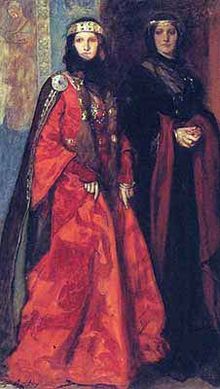Goneril
| Goneril | |
|---|---|
 Goneril and Regan by Edwin Austin Abbey | |
| Created by | William Shakespeare |
Goneril is a character in Shakespeare's tragic play King Lear (1605). She is the eldest of King Lear's three daughters. Along with her sister Regan, Goneril is considered a villain,[1] obsessed with power and overthrowing her elderly father as ruler of the kingdom of Britain. Her aggressiveness is a rare trait for a female character in Elizabethan literature.
Shakespeare based the character on Gonorilla, a personage described by Geoffrey of Monmouth in his pseudohistorical chronicle Historia regum Britanniae ("History of the Kings of Britain", c. 1138) as the eldest of the British king Lear's three daughters, alongside Regan and Cordeilla (the source for Cordelia), and the mother of Marganus.
Analysis
The earliest example of her deceitful tendencies occurs in the first act. Without a male heir, Lear is prepared to divide his kingdom among his three daughters, as long as they express their true love to him. Knowing her response will get her closer to the throne, Goneril professes, "Sir, I love you more than words can wield the matter" (1.1. 53).[2] She has no reservations about lying to her father.
She finally begins to show her true colours when Lear asks to stay with her and her husband. She tells him to send away his knights and servants because they are too loud and too numerous. Livid that he is being disrespected, Lear curses her and leaves.
Goneril, the wife of the Duke of Albany (an archaic name for Scotland), has an intimate relationship with Edmund, one that may have been played up in the earlier editions of King Lear.[3] She writes a note encouraging Edmund to kill her husband and marry her, but it is discovered. In the final act, Goneril discovers that Regan desires Edmund as well and poisons her sister’s drink, killing her. However, once Edmund is mortally wounded, Goneril goes offstage and kills herself.
Performance history
Onscreen
- Kate Fleetwood. "King Lear" (2014) National Theatre Live broadcast. Dir. Sam Mendes
- Frances Barber. King Lear (2009) PBS Dir. Sir Trevor Nunn and Chris Hunt
- Caroline Lennon. King Lear (1999) Dir. Brian Blessed & Tony Rotherham
- Barbara Flynn. Performance King Lear (1998) Dir. Richard Eyre
- Dorothy Tutin. King Lear (1983) (TV) Dir. Keith Elliott
- Gillian Barge. King Lear (1982) (TV) Dir. Jonathan Miller
- Beth Harris. King Lear (1976) (TV) Dir. Tony Davenall
- Rosalind Cash. King Lear (1974) (TV) Dir. Edwin Sherin
- Irene Worth. King Lear (1971 UK Film) Dir. Peter Brook
- Elza Radzina. Korol Lir (1971 USSR Film) Dir. Grigori Kozintsev & Iosif Shapiro
- Beatrice Straight. King Lear (1953) (TV) Dir. Andrew McCullough
References
- ^ McFarland, Thomas. The Image of Family in King Lear. Shakespearean Criticism Vol. 73. 2003. Gale Literature Resources Center, Web. 25 March 2010.
- ^ Shakespeare, William. King Lear. The Norton Shakespeare: Tragedies. Ed. Greenblatt, Cohen, Howard, Maus. W.W Norton and Company, 1997. 707–781.
- ^ Auden, W.H. Lectures on Shakespeare. ed. Kirsch, Arthur. Princeton University Press, New Jersey, 2000. 219-230
Further reading
- Smiley, Jane. A Thousand Acres. Ivy Books, 1996.
- Feinstein, Elain and the Women's Theatre Group. "Lear's Daughters" in Fischlin, Daniel and Fortier, Mark (eds.) Adaptations of Shakespeare. Routledge, 2000. 215–232
External links
- http://www.pbs.org/wnet/gperf/episodes/king-lear/watch-the-play/487/ – PBS Production of King Lear
- http://www.imdb.com/find?s=all&q=king+lear – All King Lear films
- https://www.youtube.com/watch?v=j4-fQbVohQ4&feature=related – King Lear video clips
- https://archive.org/stream/truechroniclehis00greeuoft#page/n21/mode/2up – The True Chronicle Historie of King Leir Text (1605), anonymous
- http://andromeda.rutgers.edu/~jlynch/Texts/tatelear.html – The History of King Lear (1681) by Nahum Tate
